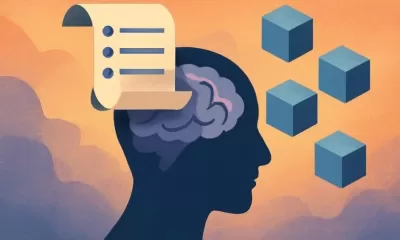AI for Lawyers: Boost Legal Expertise and Transform Careers
Welcome to the Modern Law Library, where we dive into the fascinating world of legal literature! Today, we're taking a closer look at "AI for Lawyers: How Artificial Intelligence is Adding Value, Amplifying Expertise, and Transforming Careers." Written by Noah Waisberg and Dr. Alexander Hudek, this book provides a practical guide on how artificial intelligence (AI) is reshaping the legal industry. Get ready to learn how AI can bring real value, boost your expertise, and possibly transform your legal career in ways you never imagined.
Key Points
- AI is already a part of legal practice, whether you're on board with it or not. The key is to adapt.
- AI offers chances to boost efficiency, cut down on errors, and reduce costs in legal services.
- By using AI, lawyers can deliver more value to their clients.
- It's crucial to consider concerns like the unauthorized practice of law and ethical issues when adopting AI.
- Successful AI implementation requires training AI systems to grasp the nuances of legal language.
Understanding AI's Impact on the Legal Field
The Authors' Backgrounds: A Blend of Legal and Tech Expertise
To truly grasp the insights in "AI for Lawyers," you need to know about the authors' unique backgrounds. Noah Waisberg, CEO of Kira Systems, a leading legal AI company, brings a wealth of experience. Before co-founding Kira Systems, he was a mergers and acquisitions lawyer at Weil, Gotshal & Manges in New York. His hands-on experience with M&A document review and managing teams sparked the need for a better tool. Dr. Alexander Hudek, his co-founder at Kira Systems, adds the technical know-how. Together, they blend legal and technical expertise, offering practical solutions for lawyers eager to integrate AI.

Why AI is Inevitable in Law
AI isn't some distant future; it's already woven into legal practice, whether you like it or not. This book hammers home that resisting AI is pointless—it's here to stay and will only grow in importance. Lawyers who don't adopt AI could find themselves at a serious disadvantage. It's all about recognizing where the industry is headed and doing what's necessary to serve your clients best. Ignoring AI just isn't an option anymore.
The inefficiencies AI tackles are huge. Lawyers often spend hours on repetitive tasks that are time-consuming and costly, not to mention they don't really showcase their expertise. Think about all the time wasted reading documents, which clients have to pay for. With AI, the overall cost drops, and clients get the benefit of an attorney's review at a lower price. The value clients receive with AI is significantly higher.
Leveraging AI to Enhance Law Practice
Addressing Ethical Concerns and Promoting Responsible AI Use
The authors dive into the ethical implications of AI, emphasizing the need for careful management. What used to be best practice might no longer cut it, and ignoring AI could be risky. Here are some crucial points to keep in mind:
- AI Can Be Biased: The data used to train AI can reflect societal biases, leading to unfair or discriminatory outcomes.
- Lack of Transparency: It can be tough to understand how AI reaches its decisions, raising accountability issues.
- Protecting Client Confidentiality: Data security and privacy are paramount when using AI to analyze sensitive legal documents.
- Mitigating Bias: Use diverse training data and audit AI systems carefully to reduce bias.
- Ensuring Transparency: Demand clear explanations from AI vendors about their algorithms and decision-making processes.
- Upholding Client Confidentiality: Implement strong data security protocols and follow strict privacy guidelines.

Making AI Accessible and Easy to Implement
The authors are passionate about how AI can enhance a lawyer's success. One of the biggest challenges is the understandable hesitancy lawyers feel about adopting new tools. It takes time for attorneys to fully embrace tech. One effective way to get buy-in is to ensure AI is user-friendly and easy to understand. While the tech itself can be complex, the interface for lawyers needs to be simple and accessible.

Practical Tips for Implementing AI in Your Legal Work
How Kira Can Help Automate Tasks for Attorneys
While the book doesn't offer a step-by-step guide, it provides plenty of useful tips on automating contract review and improving workflow. Here are a couple of ways Kira can help:
- Automate Contract Review: Instead of outsourcing manual work, integrate AI to streamline the process.

- Quickly Review Contracts: Lawyers often review the same things repeatedly, so automating can improve accuracy and speed.
Pricing
The price of Kira Systems varies depending on the customer's specific needs.
Pros and Cons of AI in the Legal Profession
Pros
- Increased Efficiency: AI can handle routine tasks, freeing up lawyers for more strategic work.
- Reduced Errors: AI can enhance accuracy by minimizing human error in document review and legal research.
- Lower Costs: Automating tasks with AI can reduce the need for extensive manual labor, cutting costs.
- Better Insights: AI can spot patterns and trends in legal data, offering valuable insights.
Cons
- Potential for Bias: AI algorithms might reflect societal biases, leading to unfair outcomes.
- Lack of Transparency: The complexity of AI systems can make it hard to understand their decision-making process.
- Job Displacement: AI might automate some legal jobs, potentially leading to job losses.
- Ethical Concerns: There are significant ethical issues with AI use in law, including protecting client confidentiality.
Kira Systems's Core Features
Main Features
Kira Systems helps lawyers review contracts, enhance accuracy, and save money.
Kira Systems's Use Cases
Case Studies
- Leading Law Firms: Many top-tier and large law firms use Kira to streamline contract review and due diligence.
- Corporate Legal Departments: Kira aids in-house legal teams in managing contract portfolios, ensuring compliance, and minimizing risks.
- Financial Institutions: Kira helps financial institutions review complex financial agreements and identify critical clauses.
Frequently Asked Questions
What is Kira Systems and how does it help lawyers?
Kira Systems is a legal AI company that helps lawyers by streamlining contract review. It uses machine learning to extract data, identify key clauses, and cut down on the time and cost of document analysis.
How can AI improve law practice even for those billing hourly?
As AI gets more advanced, what was once considered best practice can become risky. Using technology can improve outcomes and keep clients safer. If you're not using the best technology available, you might be putting your clients at risk. It's crucial to keep upgrading your practice to provide the best service.
Related Questions
Why Are Ethics Important in AI?
Ethics are crucial in AI because these systems increasingly make decisions that impact people's lives, from loan approvals to security assessments. If AI isn't designed and used ethically, it can perpetuate or worsen existing biases, leading to unfair or discriminatory outcomes. The complexity of AI can also make it hard to understand its decision-making process, complicating accountability. This is why ethics are so important for attorneys as well. Using technology in your practice requires a clear set of ethical standards you can trust. There's a huge responsibility to make the right decisions.
Related article
 Manus Debuts 'Wide Research' AI Tool with 100+ Agents for Web Scraping
Chinese AI innovator Manus, which previously gained attention for its pioneering multi-agent orchestration platform catering to both consumers and professional users, has unveiled a groundbreaking application of its technology that challenges convent
Manus Debuts 'Wide Research' AI Tool with 100+ Agents for Web Scraping
Chinese AI innovator Manus, which previously gained attention for its pioneering multi-agent orchestration platform catering to both consumers and professional users, has unveiled a groundbreaking application of its technology that challenges convent
 Why LLMs Ignore Instructions & How to Fix It Effectively
Understanding Why Large Language Models Skip Instructions
Large Language Models (LLMs) have transformed how we interact with AI, enabling advanced applications ranging from conversational interfaces to automated content generation and programming ass
Why LLMs Ignore Instructions & How to Fix It Effectively
Understanding Why Large Language Models Skip Instructions
Large Language Models (LLMs) have transformed how we interact with AI, enabling advanced applications ranging from conversational interfaces to automated content generation and programming ass
 Pebble Reclaims Its Original Brand Name After Legal Battle
The Return of Pebble: Name and AllPebble enthusiasts can rejoice - the beloved smartwatch brand isn't just making a comeback, it's reclaiming its iconic name. "We've successfully regained the Pebble trademark, which honestly surprised me with how smo
Comments (1)
0/200
Pebble Reclaims Its Original Brand Name After Legal Battle
The Return of Pebble: Name and AllPebble enthusiasts can rejoice - the beloved smartwatch brand isn't just making a comeback, it's reclaiming its iconic name. "We've successfully regained the Pebble trademark, which honestly surprised me with how smo
Comments (1)
0/200
![NicholasWalker]() NicholasWalker
NicholasWalker
 September 9, 2025 at 4:30:36 PM EDT
September 9, 2025 at 4:30:36 PM EDT
律師用AI?這本書聽起來超實用!不過我覺得老一輩律師可能會抗拒 🤣 畢竟法律界最愛說『我們一向都是這樣做的』... 新科技要取代那些厚厚的判例書了嗎?


 0
0
Welcome to the Modern Law Library, where we dive into the fascinating world of legal literature! Today, we're taking a closer look at "AI for Lawyers: How Artificial Intelligence is Adding Value, Amplifying Expertise, and Transforming Careers." Written by Noah Waisberg and Dr. Alexander Hudek, this book provides a practical guide on how artificial intelligence (AI) is reshaping the legal industry. Get ready to learn how AI can bring real value, boost your expertise, and possibly transform your legal career in ways you never imagined.
Key Points
- AI is already a part of legal practice, whether you're on board with it or not. The key is to adapt.
- AI offers chances to boost efficiency, cut down on errors, and reduce costs in legal services.
- By using AI, lawyers can deliver more value to their clients.
- It's crucial to consider concerns like the unauthorized practice of law and ethical issues when adopting AI.
- Successful AI implementation requires training AI systems to grasp the nuances of legal language.
Understanding AI's Impact on the Legal Field
The Authors' Backgrounds: A Blend of Legal and Tech Expertise
To truly grasp the insights in "AI for Lawyers," you need to know about the authors' unique backgrounds. Noah Waisberg, CEO of Kira Systems, a leading legal AI company, brings a wealth of experience. Before co-founding Kira Systems, he was a mergers and acquisitions lawyer at Weil, Gotshal & Manges in New York. His hands-on experience with M&A document review and managing teams sparked the need for a better tool. Dr. Alexander Hudek, his co-founder at Kira Systems, adds the technical know-how. Together, they blend legal and technical expertise, offering practical solutions for lawyers eager to integrate AI.

Why AI is Inevitable in Law
AI isn't some distant future; it's already woven into legal practice, whether you like it or not. This book hammers home that resisting AI is pointless—it's here to stay and will only grow in importance. Lawyers who don't adopt AI could find themselves at a serious disadvantage. It's all about recognizing where the industry is headed and doing what's necessary to serve your clients best. Ignoring AI just isn't an option anymore.
The inefficiencies AI tackles are huge. Lawyers often spend hours on repetitive tasks that are time-consuming and costly, not to mention they don't really showcase their expertise. Think about all the time wasted reading documents, which clients have to pay for. With AI, the overall cost drops, and clients get the benefit of an attorney's review at a lower price. The value clients receive with AI is significantly higher.
Leveraging AI to Enhance Law Practice
Addressing Ethical Concerns and Promoting Responsible AI Use
The authors dive into the ethical implications of AI, emphasizing the need for careful management. What used to be best practice might no longer cut it, and ignoring AI could be risky. Here are some crucial points to keep in mind:
- AI Can Be Biased: The data used to train AI can reflect societal biases, leading to unfair or discriminatory outcomes.
- Lack of Transparency: It can be tough to understand how AI reaches its decisions, raising accountability issues.
- Protecting Client Confidentiality: Data security and privacy are paramount when using AI to analyze sensitive legal documents.
- Mitigating Bias: Use diverse training data and audit AI systems carefully to reduce bias.
- Ensuring Transparency: Demand clear explanations from AI vendors about their algorithms and decision-making processes.
- Upholding Client Confidentiality: Implement strong data security protocols and follow strict privacy guidelines.

Making AI Accessible and Easy to Implement
The authors are passionate about how AI can enhance a lawyer's success. One of the biggest challenges is the understandable hesitancy lawyers feel about adopting new tools. It takes time for attorneys to fully embrace tech. One effective way to get buy-in is to ensure AI is user-friendly and easy to understand. While the tech itself can be complex, the interface for lawyers needs to be simple and accessible.

Practical Tips for Implementing AI in Your Legal Work
How Kira Can Help Automate Tasks for Attorneys
While the book doesn't offer a step-by-step guide, it provides plenty of useful tips on automating contract review and improving workflow. Here are a couple of ways Kira can help:
- Automate Contract Review: Instead of outsourcing manual work, integrate AI to streamline the process.
- Quickly Review Contracts: Lawyers often review the same things repeatedly, so automating can improve accuracy and speed.

Pricing
The price of Kira Systems varies depending on the customer's specific needs.
Pros and Cons of AI in the Legal Profession
Pros
- Increased Efficiency: AI can handle routine tasks, freeing up lawyers for more strategic work.
- Reduced Errors: AI can enhance accuracy by minimizing human error in document review and legal research.
- Lower Costs: Automating tasks with AI can reduce the need for extensive manual labor, cutting costs.
- Better Insights: AI can spot patterns and trends in legal data, offering valuable insights.
Cons
- Potential for Bias: AI algorithms might reflect societal biases, leading to unfair outcomes.
- Lack of Transparency: The complexity of AI systems can make it hard to understand their decision-making process.
- Job Displacement: AI might automate some legal jobs, potentially leading to job losses.
- Ethical Concerns: There are significant ethical issues with AI use in law, including protecting client confidentiality.
Kira Systems's Core Features
Main Features
Kira Systems helps lawyers review contracts, enhance accuracy, and save money.
Kira Systems's Use Cases
Case Studies
- Leading Law Firms: Many top-tier and large law firms use Kira to streamline contract review and due diligence.
- Corporate Legal Departments: Kira aids in-house legal teams in managing contract portfolios, ensuring compliance, and minimizing risks.
- Financial Institutions: Kira helps financial institutions review complex financial agreements and identify critical clauses.
Frequently Asked Questions
What is Kira Systems and how does it help lawyers?
Kira Systems is a legal AI company that helps lawyers by streamlining contract review. It uses machine learning to extract data, identify key clauses, and cut down on the time and cost of document analysis.
How can AI improve law practice even for those billing hourly?
As AI gets more advanced, what was once considered best practice can become risky. Using technology can improve outcomes and keep clients safer. If you're not using the best technology available, you might be putting your clients at risk. It's crucial to keep upgrading your practice to provide the best service.
Related Questions
Why Are Ethics Important in AI?
Ethics are crucial in AI because these systems increasingly make decisions that impact people's lives, from loan approvals to security assessments. If AI isn't designed and used ethically, it can perpetuate or worsen existing biases, leading to unfair or discriminatory outcomes. The complexity of AI can also make it hard to understand its decision-making process, complicating accountability. This is why ethics are so important for attorneys as well. Using technology in your practice requires a clear set of ethical standards you can trust. There's a huge responsibility to make the right decisions.
 Manus Debuts 'Wide Research' AI Tool with 100+ Agents for Web Scraping
Chinese AI innovator Manus, which previously gained attention for its pioneering multi-agent orchestration platform catering to both consumers and professional users, has unveiled a groundbreaking application of its technology that challenges convent
Manus Debuts 'Wide Research' AI Tool with 100+ Agents for Web Scraping
Chinese AI innovator Manus, which previously gained attention for its pioneering multi-agent orchestration platform catering to both consumers and professional users, has unveiled a groundbreaking application of its technology that challenges convent
 Why LLMs Ignore Instructions & How to Fix It Effectively
Understanding Why Large Language Models Skip Instructions
Large Language Models (LLMs) have transformed how we interact with AI, enabling advanced applications ranging from conversational interfaces to automated content generation and programming ass
Why LLMs Ignore Instructions & How to Fix It Effectively
Understanding Why Large Language Models Skip Instructions
Large Language Models (LLMs) have transformed how we interact with AI, enabling advanced applications ranging from conversational interfaces to automated content generation and programming ass
 Pebble Reclaims Its Original Brand Name After Legal Battle
The Return of Pebble: Name and AllPebble enthusiasts can rejoice - the beloved smartwatch brand isn't just making a comeback, it's reclaiming its iconic name. "We've successfully regained the Pebble trademark, which honestly surprised me with how smo
Pebble Reclaims Its Original Brand Name After Legal Battle
The Return of Pebble: Name and AllPebble enthusiasts can rejoice - the beloved smartwatch brand isn't just making a comeback, it's reclaiming its iconic name. "We've successfully regained the Pebble trademark, which honestly surprised me with how smo
 September 9, 2025 at 4:30:36 PM EDT
September 9, 2025 at 4:30:36 PM EDT
律師用AI?這本書聽起來超實用!不過我覺得老一輩律師可能會抗拒 🤣 畢竟法律界最愛說『我們一向都是這樣做的』... 新科技要取代那些厚厚的判例書了嗎?


 0
0





























